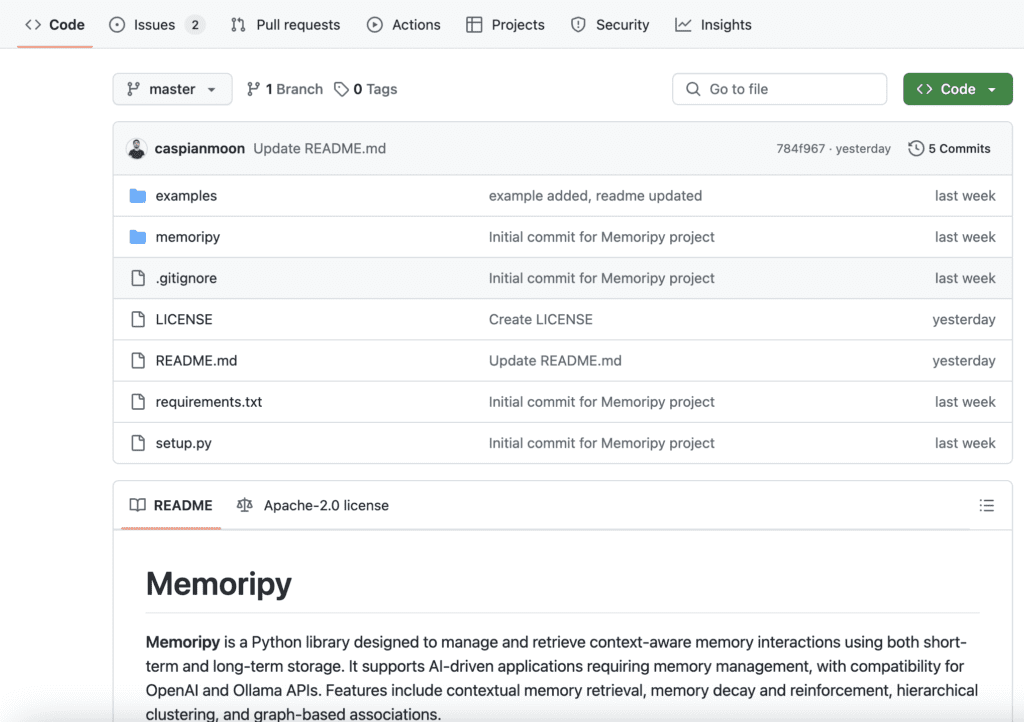Unlocking Contextual AI: How Memoripy is Revolutionizing Interaction
Artificial intelligence continues to reshape the way we engage with technology, but there’s a persistent challenge that has held many systems back—context retention during prolonged interactions. Traditional AI models, particularly in applications like chatbots and virtual assistants, often struggle to keep conversations coherent. These systems typically process inputs statelessly, leading to fragmented discussions that lack continuity. This issue has created a barrier to building engaging, context-sensitive AI that can truly enhance user experiences.
Enter Memoripy, a game-changing Python library designed to infuse genuine memory functions into AI applications. Memoripy tackles the challenge of maintaining conversational context head-on, empowering AI systems to store, recall, and build upon past interactions with a structured memory system. This innovative approach enables both short-term and long-term memory retention, ensuring that AI can remember recent conversations and critical information from the past.
The Magic of Memory Structuring
Memoripy’s memory organization is ingeniously categorized into short-term and long-term clusters, allowing the AI to prioritize recent interactions while still holding onto significant historical data. This method prevents the system from being bogged down by excessive information and ensures that relevant memories are easily retrievable. Additionally, Memoripy utilizes semantic clustering, grouping similar memories together to enhance the quality of responses.
A standout feature of Memoripy is its use of memory decay and reinforcement mechanisms—akin to human memory processes—where less useful memories fade away over time, while frequently accessed ones are strengthened. This effectively allows the system to adapt and prioritize information based on user needs.
Moreover, Memoripy’s focus on local storage enhances privacy by allowing memory operations to occur entirely on the user’s infrastructure, steering clear of potential security pitfalls posed by external servers. This flexibility is vital for developers looking to integrate with various language models, whether hosted locally or through external services like OpenAI and Ollama.
Putting Memoripy into Action
To showcase how straightforward it is to implement Memoripy in an AI application, consider the following code snippet:
from memoripy import MemoryManager, JSONStorage
def main():
api_key = "your-key"
if not api_key:
raise ValueError("Please set your OpenAI API key.")
chat_model = "openai"
chat_model_name = "gpt-4o-mini"
embedding_model = "ollama"
embedding_model_name = "mxbai-embed-large"
storage_option = JSONStorage("interaction_history.json")
memory_manager = MemoryManager(
api_key=api_key,
chat_model=chat_model,
chat_model_name=chat_model_name,
embedding_model=embedding_model,
embedding_model_name=embedding_model_name,
storage=storage_option
)
new_prompt = "My name is Khazar"
short_term, _ = memory_manager.load_history()
last_interactions = short_term[-5:] if len(short_term) >= 5 else short_term
relevant_interactions = memory_manager.retrieve_relevant_interactions(new_prompt, exclude_last_n=5)
response = memory_manager.generate_response(new_prompt, last_interactions, relevant_interactions)
print(f"Generated response:\n{response}")
combined_text = f"{new_prompt} {response}"
concepts = memory_manager.extract_concepts(combined_text)
new_embedding = memory_manager.get_embedding(combined_text)
memory_manager.add_interaction(new_prompt, response, new_embedding, concepts)
if __name__ == "__main__":
main()In this example, the MemoryManager gets initialized with specific models and a storage option. The system processes new user prompts while recalling previous interactions, paving the way for contextually appropriate responses that can adapt over time.
Enriching AI User Experiences
Memoripy marks a vital step towards enhancing the capabilities of AI systems. With its robust memory functions, developers can create virtual assistants and conversational agents that remember user preferences or past requests, offering personalized assistance like never before. Early evaluations have shown that AI systems integrated with Memoripy deliver improved user satisfaction, leading to more coherent and relevant responses.
Furthermore, Memoripy’s emphasis on local memory storage ensures that personal data remains secure, appealing to privacy-conscious users. This opens doors for developing applications in sectors such as customer service and personal assistance, transforming how we interact with technology.
Conclusion
In summary, Memoripy offers a significant breakthrough in the quest for more intelligent and contextually aware AI systems. By mimicking human cognitive processes through structured memory, it enables AI applications to evolve based on cumulative interactions, enhancing personalization and user engagement. The tools provided by Memoripy equip developers to create AI that learns meaningfully from interactions—not just as a reactive system, but as a truly interactive companion.
The AI Buzz Hub team is excited to see where these breakthroughs take us. Want to stay in the loop on all things AI? Subscribe to our newsletter or share this article with your fellow enthusiasts.




